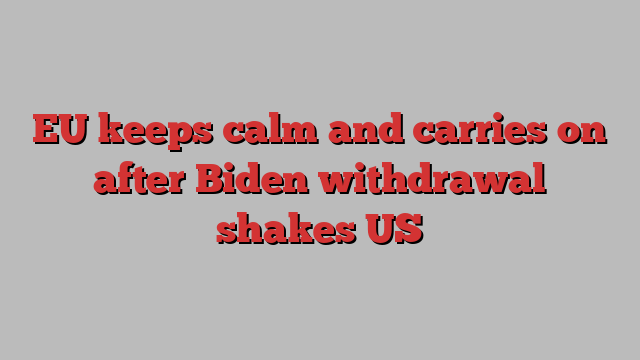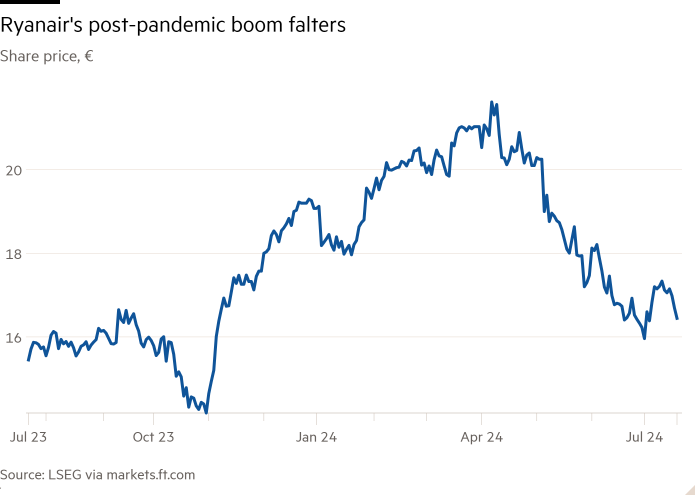
This article is an on-site version of our Europe Express newsletter. Premium subscribers can sign up here to get the newsletter delivered every weekday and Saturday morning. Standard subscribers can upgrade to Premium here, or explore all FT newsletters
Good morning. Yesterday evening brought more consequences for Hungarian premier Viktor Orbán’s “peace mission” diplomacy, with news that the next meeting of bloc foreign ministers will take place in Brussels, not Budapest. But does he care?
Today, we look at Europe’s subdued reaction to Biden withdrawing from the election. And our Spain bureau chief has a dispatch on the latest twist in the corruption probe concerning the wife of Prime Minister Pedro Sánchez.
Steady on
While high drama is unfolding in the US following President Joe Biden’s withdrawal from the presidential election campaign, Europe is keeping its calm, write Laura Dubois and Paola Tamma.
Context: US vice-president Kamala Harris is now all-but certain to be the Democratic candidate for president, following Biden’s decision to drop out of the presidential race. The switch comes after weeks of lobbying by Democrats in response to Biden’s disastrous debate with Republican candidate Donald Trump.
Several EU foreign ministers yesterday praised Biden for his “courage” in stepping down from the race. Germany’s Annalena Baerbock said Biden “put the interests of his country above his own”, adding: “I have a lot of respect for the choice of US President Joe Biden.”
“You need courage . . . it’s a courageous, a difficult decision,” said Luxembourg’s Xavier Bettel, adding that the move “brings back a bit of momentum to the electoral period”.
Hadja Lahbib, Belgium’s foreign minister, said the “withdrawal of Biden doesn’t mean the victory of Trump”. She also expressed her support for Harris: “It’s a woman, it’s a strong woman and I wish her all the best.”
Many in Europe view a potential second Trump presidency with dread, while Harris would likely provide continuity from the Biden administration. Trump has questioned whether the US would defend its Nato allies in the event of conflict and criticised military aid to Ukraine.
Baerbock said that Biden had done “a lot for transatlantic co-operation”, and that “Nato is stronger than ever”. But she also added: “Regardless of the results of the election we must invest more in our security, Europe must become stronger in security and defence policy.”
Several ministers emphasised that they would work with whoever ends up sitting in the White House. “Let’s remember the Trump administration previously was actually good for European defence,” said Latvia’s Baiba Braže. “They put more money, more troops in Europe . . . I don’t expect any surprises.”
The EU’s chief diplomat Josep Borrell reminded everyone that the EU can’t wait for the US to cast its vote. “We need to continue helping Ukraine . . . we need to assume our responsibility here and now,” Borrell said. “We can’t wait to see what happens in November.”
US ambassador to the EU Mark Gitenstein, who said his longtime friend Biden had displayed “characteristic selflessness and humility”, told the Financial Times he would remain “laser focused” on co-operation with Brussels: “We still have important work to do, to help our friends in Ukraine who are fighting for their freedom and democracy.”
Chart du jour: Turbulence

Ryanair said airfares over summer months would be “materially lower” than last year, as the industry’s post-pandemic resurgence appears to wane.
Question time
Pedro Sánchez’s party is putting on a brave face as the Spanish prime minister has been called to testify as part of a criminal investigation into his wife’s alleged corruption, writes Barney Jopson.
Context: Sánchez has said he is the target of a rightwing smear campaign since a judge opened a graft investigation into his wife Begoña Gómez, which continues to dominate Spanish politics. The opposition says it is reason for him to quit.
Now the premier has been called as a witness himself on July 30, and will answer a judge’s questions at his official residence.
Patxi López, parliamentary spokesperson for Sánchez’s Socialist party, blamed the “witch-hunt” on the opposition People’s party (PP) and the far-right Vox, and said “democracy is stronger than them and their strategies”.
He also suggested that Sánchez was unsurprised because he had already predicted that he would be called to testify by the judge, Juan Carlos Peinado of the High Court of Justice in Madrid.
The last time a sitting Spanish prime minister was summoned to testify in a judicial case was in 2017, when the PP’s Mariano Rajoy was called in a corruption case that led to convictions for several members of his party.
Alberto Núñez Feijóo, PP leader, recalled yesterday that Sánchez had urged Rajoy to resign at the time, and said it was Sánchez who should now quit. “What an image of the country,” Feijóo said, referring to next week’s interrogation.
Sánchez has denied any wrongdoing by his wife and no charges have been filed. Gómez has not commented publicly on the case.
What to watch today
-
Ukraine’s foreign minister Dmytro Kuleba visits China.
-
German foreign minister Annalena Baerbock hosts her newly appointed Dutch counterpart Caspar Veldkamp.
Now read these
Recommended newsletters for you
The State of Britain — Helping you navigate the twists and turns of Britain’s post-Brexit relationship with Europe and beyond. Sign up here
Chris Giles on Central Banks — Your essential guide to money, interest rates, inflation and what central banks are thinking. Sign up here
Are you enjoying Europe Express? Sign up here to have it delivered straight to your inbox every workday at 7am CET and on Saturdays at noon CET. Do tell us what you think, we love to hear from you: [email protected]. Keep up with the latest European stories @FT Europe